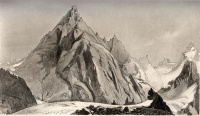Alps
From The Art and Popular Culture Encyclopedia
| Revision as of 17:45, 18 January 2017 Jahsonic (Talk | contribs) ← Previous diff |
Revision as of 21:15, 19 August 2021 Jahsonic (Talk | contribs) Next diff → |
||
| Line 1: | Line 1: | ||
| + | {| class="toccolours" style="float: left; margin-left: 1em; margin-right: 2em; font-size: 85%; background:#c6dbf7; color:black; width:30em; max-width: 40%;" cellspacing="5" | ||
| + | | style="text-align: left;" | | ||
| + | "The [[Alps]] […] fill the mind with an agreeable kind of [[horror]]."--''[[Remarks on Several Parts of Italy]]'' (1705) by Joseph Addison | ||
| + | |} | ||
| [[Image:The Aigiulle Blaitiere. c. 1856 by John Ruskin.jpg|thumb|200px|''[[The Aiguille Blaitiere]]'' (c. [[1856]]) by [[John Ruskin]], see [[Aiguilles de Chamonix]]]] | [[Image:The Aigiulle Blaitiere. c. 1856 by John Ruskin.jpg|thumb|200px|''[[The Aiguille Blaitiere]]'' (c. [[1856]]) by [[John Ruskin]], see [[Aiguilles de Chamonix]]]] | ||
| {{Template}} | {{Template}} | ||
Revision as of 21:15, 19 August 2021
|
"The Alps […] fill the mind with an agreeable kind of horror."--Remarks on Several Parts of Italy (1705) by Joseph Addison |
|
Related e |
|
Featured: |
The Alps are a mountain range in Western Europe, running from France to Austria, with its highest peak Mont Blanc at 4808 meters.
The Alps and the sublime
The Englishmen Anthony Ashley Cooper, third earl of Shaftesbury, John Dennis and Joseph Addison's had all three within the span of several years, made the Grand Tour across the Alps and commented in their writings of the horrors and harmony of the experience, expressing a contrast of aesthetic qualities, wich they denoted as sublime.
John Dennis was the first to publish his comments in a journal letter published as Miscellanies in 1693, giving an account of crossing the Alps where, contrary to his prior feelings for the beauty of nature as a "delight that is consistent with reason", the experience of the journey was at once a pleasure to the eye as music is to the ear, but "mingled with Horrours, and sometimes almost with despair". Shaftesbury had made the journey two years prior to Dennis but did not publish his comments until 1709 in the Moralists. His comments on the experience also reflected pleasure and repulsion, citing a "wasted mountain" that showed itself to the world as a "noble ruin" (Part III, Sec. 1, 390-91), but his concept of the sublime in relation to beauty was one of degree rather than the sharp contradistinction that Dennis developed into a new form of literary criticism. Shaftesbury's writings reflect more of a regard for the awe of the infinity of space ("Space astonishes" referring to the Alps), where the sublime was not an aesthetic quality in opposition to beauty, but a quality of a grander and higher importance than beauty. In referring to the Earth as a "Mansion-Globe" and "Man-Container" Shaftsbury writes "How narrow then must it appear compar'd with the capacious System of its own Sun...tho animated with a sublime Celestial Spirit...." (Part III, sec. 1, 373).
Joseph Addison embarked on the Grand Tour in 1699 and commented in Remarks on Several Parts of Italy etc. that "The Alps fill the mind with an agreeable kind of horror". The significance of Addison's concept of the sublime is that the three pleasures of the imagination that he identified; greatness, uncommonness, and beauty, "arise from visible objects" (sight rather than rhetoric). It is also notable that in writing on the "Sublime in external Nature", he does not use the term "sublime", but uses terms that would be considered as absolutive superlatives, e.g. "unbounded", "unlimited", as well as "spacious", "greatness", and on occasion terms denoting excess.
Usage notes
Usually referred to as "the Alps".


